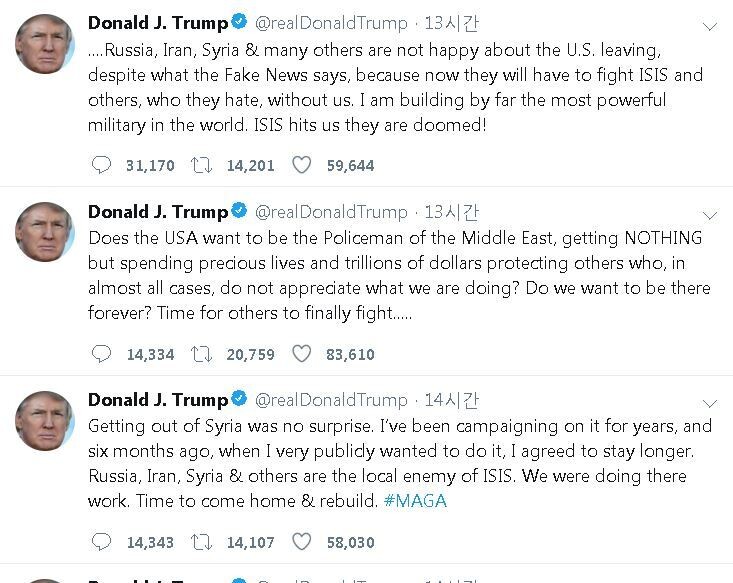hankyoreh
Links to other country sites 다른 나라 사이트 링크
[Editorial] S. Korea needs to keep an eye on how Trump’s isolationism impacts Northeast Asia

On Dec. 20, US President Donald Trump suddenly announced the complete withdrawal of American troops from Syria. This came more than three years after ground troops were deployed there because of the Syrian civil war in 2015, during the presidency of Barack Obama. More than 2,000 American troops dispatched in northeast Syria have been supporting the rebel Syrian Democratic Forces (SDF) in their fight against the Islamic State (IS) extremists.
Trump reportedly made this decision in the teeth of opposition from his key foreign policy and security advisors. US Secretary of Defense James Mattis immediately announced his resignation in protest of the decision. There have also been numerous reports indicating that Trump is considering the idea of reducing US presence in Afghanistan. The Trump administration’s isolationism – which only advocates its goal of “America first” in an economic sense while abandoning the US’ role as “global policeman” – appears to be moving into high gear. Since South Korea regards its alliance with the US as a pillar of stability on the Korean Peninsula, it will have to keep an eye on how Trump’s isolationism impacts Northeast Asia.
Many are concerned that the abrupt withdrawal of US troops from Syria will upset the delicate balance of power between the US and Russia, and between Syrian government troops and the rebels, exacerbating instability across the entire Middle East. Nevertheless, we ought to note that withdrawing US troops from Syria was one of Trump’s campaign pledges.
We should not assume that the acceleration of Trump’s isolationism will necessarily work to South Korea’s disadvantage. Depending on how we play our cards, this could actually have a positive effect on efforts to advance inter-Korean arms control. In the short term, it’s certainly likely that the Trump administration’s emphasis on “economic interest” will put more pressure on South Korea to increase its share of the cost of stationing US troops on the Korean Peninsula. That’s why the South Korean government needs to take action while carefully observing the shifting trends of US foreign policy.
The withdrawal of US troops from the Middle East isn’t likely to lead immediately to the readjustment of American troops in South Korea and other parts of Northeast Asia. From the US point of view, there’s no reason to add a new variable to Korean Peninsula affairs before the North Korea-US denuclearization talks get results. But as Trump’s isolationism takes off, it will become difficult for some sectors of South Korean society to maintain their absolute taboo on discussing the question of the status of US Forces Korea. The South Korean government will need to be much more sophisticated and forward-looking in its preparations for a range of issues, including the transfer of wartime operational control, joint exercises with US troops, and adjusting its share of the cost of defense.
Please direct comments or questions to [english@hani.co.kr]

Editorial・opinion
![[Editorial] Intensifying US-China rivalry means Seoul must address uncertainty with Beijing sooner than later [Editorial] Intensifying US-China rivalry means Seoul must address uncertainty with Beijing sooner than later](https://flexible.img.hani.co.kr/flexible/normal/500/300/imgdb/original/2024/0517/8117159322045222.jpg) [Editorial] Intensifying US-China rivalry means Seoul must address uncertainty with Beijing sooner than later
[Editorial] Intensifying US-China rivalry means Seoul must address uncertainty with Beijing sooner than later![[Column] When ‘fairness’ means hate and violence [Column] When ‘fairness’ means hate and violence](https://flexible.img.hani.co.kr/flexible/normal/500/300/imgdb/original/2024/0516/7417158465908824.jpg) [Column] When ‘fairness’ means hate and violence
[Column] When ‘fairness’ means hate and violence- [Editorial] Yoon must stop abusing authority to shield himself from investigation
- [Column] US troop withdrawal from Korea could be the Acheson Line all over
- [Column] How to win back readers who’ve turned to YouTube for news
- [Column] Welcome to the president’s pity party
- [Editorial] Korea must respond firmly to Japan’s attempt to usurp Line
- [Editorial] Transfers of prosecutors investigating Korea’s first lady send chilling message
- [Column] Will Seoul’s ties with Moscow really recover on their own?
- [Column] Samsung’s ‘lost decade’ and Lee Jae-yong’s mismatched chopsticks
Most viewed articles
- 1[Editorial] Transfers of prosecutors investigating Korea’s first lady send chilling message
- 2[Column] US troop withdrawal from Korea could be the Acheson Line all over
- 3[Exclusive] Unearthed memo suggests Gwangju Uprising missing may have been cremated
- 4Xi, Putin ‘oppose acts of military intimidation’ against N. Korea by US in joint statement
- 5‘Shot, stabbed, piled on a truck’: Mystery of missing dead at Gwangju Prison
- 6[Column] When ‘fairness’ means hate and violence
- 7Spotlight turns to Hyundai Group Chairwoman’s visit to North Korea
- 8[Column] Samsung’s ‘lost decade’ and Lee Jae-yong’s mismatched chopsticks
- 9[Column] Will Seoul’s ties with Moscow really recover on their own?
- 10[Editorial] Intensifying US-China rivalry means Seoul must address uncertainty with Beijing sooner t